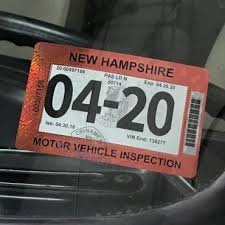As a state representative in New Hampshire, my job is simple: listen to my constituents and fight for their voices in Concord. Right now, those voices are loud and clear—Granite Staters want HB 649, a bill to eliminate mandatory annual vehicle inspections, to pass the Senate Commerce Committee on April 1.
This isn’t just another vote; it’s a litmus test for whether our senators truly represent us or bend to other influences—like the auto dealers and others who profit from this outdated mandate. Our constituents are watching closely, and the stakes couldn’t be higher in our “Live Free or Die” state.
Let’s start with the facts. New Hampshire is one of only 14 states still clinging to annual vehicle safety inspections for passenger cars. That’s right—36 states, from Florida to Colorado, trust their drivers to keep their vehicles roadworthy without the government playing nanny. Here, we don’t mandate inspections of firearms before a day at the range, boats before a lake outing, snowmobiles before hitting the trails, or OHRVs before tearing through the woods.
Why, then, do we treat cars like some sacred exception? This mandate feels like subjugation on a state that prides itself on liberty—a relic of control in a place where personal responsibility should reign supreme.
Constituents across New Hampshire have weighed in, and the message is resounding: scrap this requirement. They see it for what it is—fool’s gold, a shiny promise of safety that crumbles under scrutiny while alchemists in the inspection industry turn rust into revenue.
The data tell the tale.
According to the National Highway Traffic Safety Administration, vehicle component failure accounts for just 2% of traffic accidents nationwide. In 2023, New Hampshire logged 127 fatal crashes, per the state’s Department of Safety. Even if we generously assume 4% were due to mechanical issues—a stretch given modern vehicle reliability—that’s roughly five incidents. Are we really justifying a $55 million annual burden on drivers (based on 1,383,700 inspections at $35-$50 each) for a handful of edge cases with extenuating circumstances?
This isn’t about safety—it’s about who’s cashing in. Inspection stations and auto dealers rake in millions, while towns pocket a slice of the $3.25 sticker fee, with 12% redistributed as block grants. HB 649 would cut nearly $3 million from the highway fund and $346,500 from municipal budgets annually, per the bill’s fiscal note. Opponents cry revenue loss, but since when does “Live Free or Die” mean taxing freedom to prop up one specific industry? After all, this isn’t Boeing. If senators prioritize these interests over constituents, they’re misreading the room—and the state’s watching.
Contrast this with the 36 states that thrive without inspections. Their roads aren’t crumbling chaos. A 2015 Government Accountability Office report found no clear link between mandatory inspections and reduced crashes. New Hampshire’s accident statistics—98% tied to driver errors like speeding or distraction scream that our focus should be elsewhere. Inspections are a diversionary distraction that shifts the focus while the real risks go unchecked.
April 1 is more than a Senate Committee vote; it’s a referendum on freedom. Senators face a choice: stand with the people or kowtow to the strategic alchemists peddling fool’s gold. New Hampshire’s Senate primaries are somewhat rare, but history shows they’re a highly effective tool when surgically deployed —quietly ensuring accountability when influence drifts too far from the voter’s will. The House of Representatives was acutely aware of this and passed the bill 212-143 on a roll call vote.
I represent my constituents, and do so proudly, and the people of New Hampshire are tired of this charade. Pass HB 649, and let’s prove “Live Free or Die” isn’t just a slogan—it’s a primary principle worth defending.


